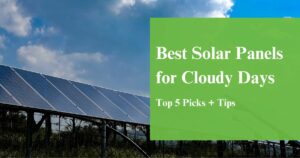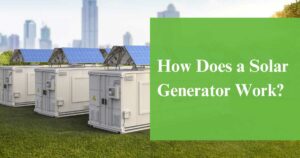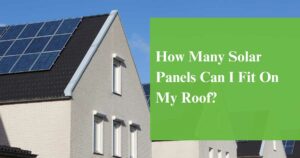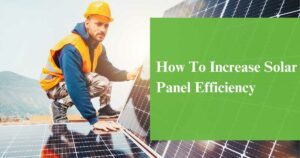How Much Do Solar Panels Cost to Install?
Written by qualified solar engineer Leonardo. Last updated:
Page Contents
The cost of installing solar panels depends on many factors, but a U.S. homeowner can expect to pay around $3 per watt. For example, a 5000-watt solar panel installation would cost about $15,000. These figures are excluding solar tax credits which reduce costs by 30% to around $10,500.
Solar energy systems experience economies of scale. This means a large installation will tend to have a lower cost per watt, even when the total cost increases. Medium-sized businesses may reach solar system costs below $2 per watt, which is lower than the residential installed cost. In large facilities, solar energy can achieve an installed system cost below $1 per watt.
Residential solar power does not have such a drastic cost variation. However, you can still expect a slight price variation based on scale. A 10-kW solar system is more expensive than a 2-kW installation, but its cost per watt will be slightly lower.
Solar companies often have panel cost calculators on their websites, which gives you an idea of how much you can expect to pay. However, an accurate solar panel installation cost can only be determined with a professional assessment of your property. Keep this in mind when using a solar calculator.
How Much do Solar Panels Cost for an Average House?
Residential solar systems can be found in a wide range of sizes, but the typical household in the United States can get good results with around 5 kilowatts of capacity.
This example assumes a national average solar system capacity of 5kW, but actual projects are based on a professional assessment of each property. The amount of energy solar panels produce is determined by the local sunshine, which means you need more panels in places that get less sunshine.
The amount of solar panels needed for an average house depends on their individual capacity. An installation that uses 250-watt panels will need 20 to reach 5 kilowatts, but a system using 320-watt panels will only require 16. The most efficient solar panels need less space, since you are installing more watts per square foot. However, the specific panel capacity has little effect on the average cost of solar power.
Before purchasing a solar power system for your home, make sure you contact several contractors to compare their solar offers. Your first option will not necessarily be the most affordable.
What Solar Panel System Size Does My Home Need?
Solar panels have a modular design, which allows their use in projects of all scales. However, finding the right system size is a very important design decision. Both undersized and oversized installations have disadvantages.
An undersized installation has a lower price, but the average cost per watt will tend to be higher. This makes the payback period longer, while reducing the return on each dollar spent. If the number of panels is too small for your home, your power bill will only be reduced slightly.
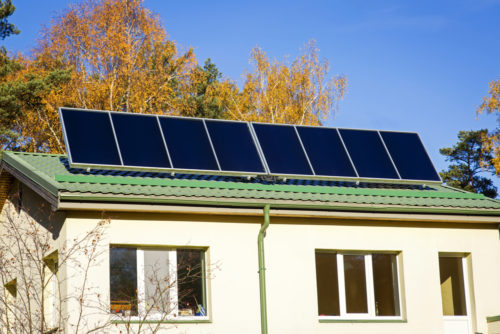
On the other hand, oversized solar systems represent a waste of capacity. If your utility company offers net metering, any solar generation you don’t use is exported to the grid and subtracted from your energy bill. However, power companies often place limits for net metering:
- You can use surplus generation to offset your electricity usage at night. However, in most cases you can only expect to reduce the power bill to zero. Only a few power companies pay you for producing more than what you consume in a year.
- There may be system size limits for net metering, and any capacity beyond the limit is not eligible.
- Surplus electricity production is not always credited at the full kilowatt-hour price. Many power companies apply a smaller rate, which reduces the value of surplus generation.
The main factors that determine the optimal solar system capacity are the energy needs of your home and the local rules for net metering. Larger solar power systems with surplus production make sense if these rules are favorable.
Are There Financial Incentives for Residential Solar Panels?
The average price of $15,000 for a 5kW installation ignores the incentives available for solar power throughout the US. Once these benefits are factored in, you can expect to pay much less. The most common types of incentives are the following:
- Making solar systems exempt from the sales tax or the property tax
- Federal and state tax credits
- Rebates, where the power company or local government gives you an upfront cash incentive for going solar
Tax exemptions are great, since they reduce the ownership cost of solar panels directly. Solar tax credits do not reduce the installation cost directly, but they let you deduct a percentage from your tax burden. The US has a 30% federal tax credit for solar installations, which applies for the entire country until the end of 2019.
Solar rebates are cash incentives that reduce the net cost of the installation. When rebates and tax incentives are available in the same location, the credits are calculated with the net price after subtracting the rebate.
Of all the incentives mentioned in this section, only the 30% solar tax incentive from the federal government applies in the entire country. The availability of state tax benefits and rebates changes by location.
What Happens to the Federal Solar Tax Credit After 2019?
Thanks to the 30% federal tax credit, a solar installation with a sales price of $15,000 has a net cost of only $10,500. However, this incentive will be gradually reduced between 2020 and 2022. The following table demonstrates how the federal incentive would drop in the case of a 5-kW system with a price of $15,000.
Year | Solar Tax Credit (%) | Tax Deduction ($) | Net Cost ($) |
2019 | 30% | $4,500 | $10,500 |
2020 | 26% | $3,900 | $11,100 |
2021 | 22% | $3,300 | $11,700 |
2022 | 0% | $0 | $15,000 |
The federal tax incentive becomes 0% for residential solar energy systems in 2022, and only a 10% credit will remain for commercial installations. Even if the cost of solar panels continues to decrease during the next years, they will seem to be more expensive as the tax incentive is phased out. The solar panel costs that are possible in 2019 thanks to the tax deduction will not be available again, until the sales price of solar systems decreases by 30%.
The 30% federal tax credit applies for solar batteries as well, but there are two conditions:
- Batteries only get the credit if they get at least 75% of their charge from solar panels or another eligible renewable energy system.
- The solar panels and the batteries must have the same owner.
The credit given for batteries is based on their solar charging percentage. For example, a home battery that gets 80% of its charge from solar panels gets 80% of the credit, equivalent to 24%. On the other hand, a battery that is fully charged with solar generation gets the full credit of 30%.
When using a solar panel cost calculator, check if the tool deducts tax benefits automatically. Some solar providers have this feature built in, while others calculate the price before incentives.
Understanding the Price of Solar Panels
If you look for solar panels online, you will notice that the cost per watt is much lower than $3. However, the number is lower because only solar panel prices are considered. Some manufacturers have achieved solar panel costs below $0.30 per watt.
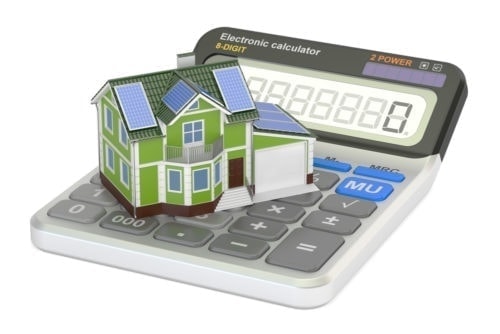
A complete solar system is much more expensive than the individual panels. However, it makes sense once you learn how solar panels are installed:
- To be installed safely on your rooftop, solar panels are mounted on special racking.
- Solar panels must also be connected together with special wiring, in order to collect their energy production.
- Because of how the solar panels work, electricity is produced as direct current. A solar inverter converts the electric power into alternating current, which is suitable for home appliance.
- Like any electrical installation, a solar system must be protected by special breakers. These are found inside a fuse box.
All of these components count towards the total price of a solar power system, and you must consider there are delivery costs as well. Also, keep in mind that solar companies are businesses after all, and they add a profit margin. You can find the best solar company by comparing several offers.
The prices discussed in this article are for conventional solar systems. Solar roofs are much more expensive, typically above $8 per watt. However, solar shingles can be viable in new constructions, since the consolidate the roof and the panels into a single element.
Recommendations When Purchasing a Solar Panel System
The installation cost of solar panels is important, buy focusing on price only is not the best approach. When comparing offers from different solar contractors, consider the following aspects:
- How long solar panels last: Solar panels can be expected to last for over two decades, but make sure you are covered by warranties. The best solar panels come with a 10-year warranty against manufacturing defects. There is also a 25-year warranty for energy production above 80% of the rated value.
- Knowing how efficient solar panels are: Solar panel efficiency can be estimated by dividing their rated wattage and area. If two panels of the same size and different brands are rated at 320W and 250W, the 320W panel is more efficient. High efficiency panels use the available space more effectively, but this is only an issue if your roof space is limited.
- The amount of money solar panels save you: Offers from solar companies may differ not only in price, but also in savings achieved. There may be cases where a more expensive system also produces more energy, and its extra cost is recovered many times as power bill savings.
When negotiating with solar installers, ask for a detailed budget of the project. The solar offers should be broken down into line items with unit prices, instead of presenting a lump sum. This way you can compare individual components, and you get a clear picture of what you are purchasing. When a lump sum is provided, there is no information on how the solar cost is broken down, and there could be hidden costs.
The solar system price you get should cover all components and activities necessary to have the panels installed and operational. Ask your solar contractor if the following costs are covered:
- Solar panel and component deliveries
- Taxes, work permits, and interconnection fees
A complete solar offer also includes a savings estimate with the expected kilowatt-hour output. While this is not part of the project cost, it gives you an idea of the payback period and return on investment. The solar offer with the lowest cost per watt will not necessarily be the one with the best performance.
Install Solar Panels at Zero Upfront Cost
Solar power offers an attractive return on investment for homeowners, but the upfront cost can be high. However, there is no need to assume the full cost at once. Many banks offer solar panel finance options, which bring several benefits:
- The upfront cost is covered by the bank’s money.
- Loan payments are covered by the solar savings.
This approach works best if you have access to favorable loan conditions, such as a low interest rate and a long repayment period. High-interest financing options such as credit cards are not viable if you want a solar panel installation to pay itself.
If you are unwilling to take a loan to install a solar power system, leasing is also a viable option. The solar panel lease cost is calculated to be lower than the power bill savings, leaving cash in your pocket from the first month of use.
When choosing between solar loans and leasing, consider the pros and cons of each option. Loan financing lets you claim the solar tax credits and rebates, since you own the installation. However, you are fully responsible for system maintenance and component replacements. On the other hand, a solar lease makes the provider responsible for maintenance, but you lose the ownership benefits.
An online solar panel calculator is useful as a starting point for a purchase decision. However, it cannot replace a professional assessment. There are many site-specific factors that affect the cost of a solar energy system. The cost varies by state, so that is also something important to consider.
We hope you liked this article. Please rate it or leave us a comment.
Average rating 4.9 / 5. Vote count: 24
No votes so far! Be the first to rate this post.

